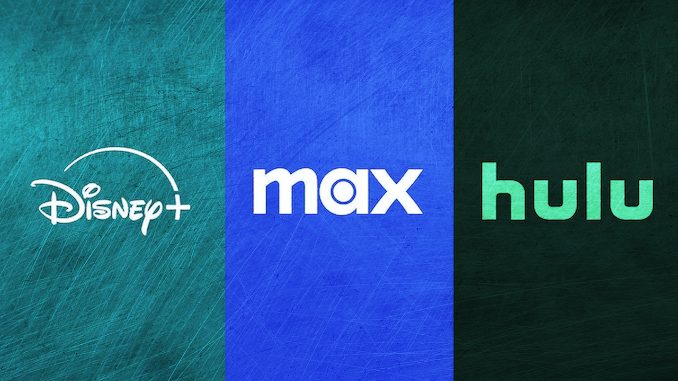Streaming Giants Unite: Disney and Warner Bros. Announce Cross-Studio Bundle

Disney and Warner Bros. Discovery (WBD) recently announced a rare cross-studio streaming bundle in a strategic reversal to retain fleeing subscribers. This new offering will merge Disney+ and Hulu with Warner Bros.’ Max, which features a wide array of content from the studio along with its premium service, HBO.
This partnership aims to attract new viewers with a comprehensive entertainment package and reduce subscriber churn for both companies. It represents the latest step in transforming isolated streaming services into a modern version of cable television.
Disney and Warner Streaming Bundle Desperate Strategic Turn
The streaming wars have taken a dramatic turn, with content heavyweights WBD and Disney joining forces to create a streaming bundle that includes Max, Disney+, and Hulu. This surprising alliance between fierce rivals marks a dramatic shift in the streaming landscape, moving away from exclusive content silos to a broader licensing model.
While WBD promotes this partnership as a significant success, it also subtly highlights the failures of its previous strategies. It’s difficult to overstate the disastrous few years WBD has experienced under disjointed leadership. Boosting one of the most desirable film and television catalogs, the company has stumbled over every vital decision since AT&T acquired it in 2016.
First, Warner Bros. was the last major studio to enter the streaming scene, launching HBO Max in May 2020 before rebranding it as Max in May 2023; more on the rebranding below. Other major studios had been in the game for years:
Hulu started in 2009.
Paramount started operating CBS All Access in 2014.
Disney+ debuted in 2019.
Peacock launched a month before HBO Max in April 2020.
Next, amid widespread theater closures related to lockdowns, Warner Bros. dealt a heavy blow to the traditional theatrical model in 2021 by dumping its entire 17-film slate onto its struggling HBO Max streaming platform. These films were released simultaneously in limited theaters permitted to stay open.
Following several streaming missteps, Warner Bros. tossed aside one of the most recognizable brands of the last fifty years when it renamed HBO Max to simply Max. This decision will likely become a case study in marketing courses for decades, illustrating a notable failure in brand management.
The rebranding of HBO Max to Max was intended to expand its appeal beyond HBO’s niche, edgy content. However, inconsistent messaging and reduced kids and family content have resulted in only modest subscriber growth.
Currently, Max has around 100 million subscribers, with approximately 52 million in the US and Canada and 47 million internationally. However, since early 2023, Max has seen a decline in domestic subscribers nearly every quarter, dropping from its peak of 55 million in the first quarter of 2023.
Set for launch this summer in the US, pricing details and an exact launch date have not been announced, but the bundle will be offered as both an ad-supported and ad-free plan and available for purchase on any of the three streaming platform’s websites. Disney’s existing bundle, including Disney+, Hulu, and ESPN+, costs $14.99 per month with ads and $24.99 without ads.
Despite Modest Profits, Streaming is Sinking the Studios
Disney reported a $47 million quarterly profit from its Hulu and Disney+ services, while WBD earned $103 million from its Max service in 2023. Disney’s CEO highlighted streaming as a key growth area and announced plans to slow down the production of Marvel content, focusing on quality over quantity. Disney will limit Marvel releases to about two TV series and two to three movies per year. This reversal is a notable decrease from the previous output of over four Marvel shows annually on Disney+ and the ten films released between July 2021 and November 2023.
In May, when Disney reported $22.08 billion in revenue in the three months ending March 30, shares fell 10%, its worst day since 2022. In one day, Disney lost $20 billion in market value, roughly equivalent to the total market capitalization of entertainment rival and HBO parent WBD.
Studio streaming services continue to face an uphill battle in reversing the billions lost since trying to catch up to Netflix after the streamer grew into the golem that the studios created.
Source:Filmtake

Hot News
- Chinese-Animated Series ‘A Herbivorous Dragon of 5,000 Years Gets Unfairly Villainized’ Season 2 Reveals Opening, Teaser, Additional Cast
- Cartoon Forum 2024-35th anniversary
- Tiger & Bunny Producer Establishes New Company
- Animated Feature were Nomineed In Animated Feature Category By European Film Awards
- Studio 100 International unveils its MIPCOM kids lineup
- The 37th European Film Awards ceremony for the best European films of the year will be held in Switzerland for the first time
- Popular Anime ‘Obocchama-kun’ Premiering At MIPCOM
- ADVENTURE AWAITS IN COZY MMORPG GO GO MUFFIN!
